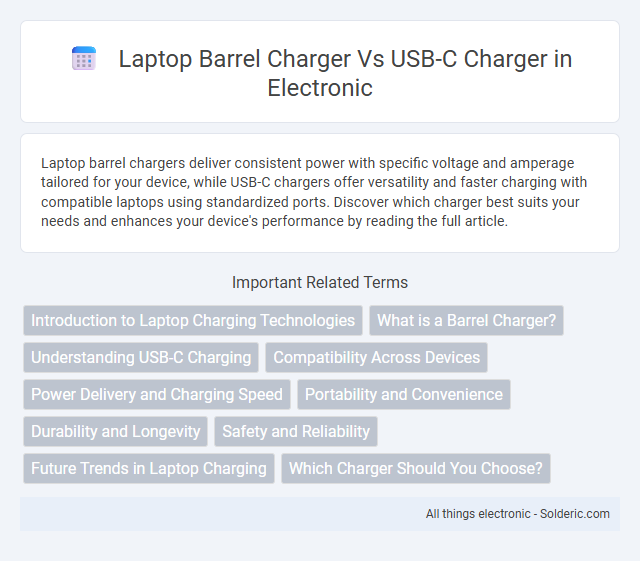Laptop barrel chargers deliver consistent power with specific voltage and amperage tailored for your device, while USB-C chargers offer versatility and faster charging with compatible laptops using standardized ports. Discover which charger best suits your needs and enhances your device's performance by reading the full article.
Comparison Table
| Feature | Laptop Barrel Charger | USB-C Charger |
|---|---|---|
| Connector Type | Cylindrical barrel plug | USB Type-C reversible plug |
| Compatibility | Model-specific, proprietary connectors | Universal across many devices and brands |
| Power Delivery | Fixed voltage and amperage | Supports USB Power Delivery (up to 100W+) |
| Charging Speed | Varies by model, generally slower | Faster, adaptive charging supported |
| Data Transfer | No data functionality | Supports data and video transfer |
| Durability | Single-function, bulky connector | Compact, reversible, less wear |
| Port Availability | Dedicated charging port only | Multi-purpose port for charging, data, video |
| Price | Typically lower cost per charger | Can be more expensive due to multi-functionality |
| Future Proofing | Limited, as manufacturers move away from barrel plugs | High, industry standard for future devices |
Introduction to Laptop Charging Technologies
Laptop barrel chargers provide a traditional power connection with a specific voltage and current designed for the laptop model, ensuring stable and reliable charging. USB-C chargers support fast charging and power delivery standards, offering universal compatibility with multiple devices beyond laptops, such as smartphones and tablets. Understanding your laptop's charging port and power requirements helps you choose the right charger to optimize battery health and charging efficiency.
What is a Barrel Charger?
A barrel charger is a cylindrical power connector commonly used to supply direct current (DC) to laptops and other electronic devices, featuring a plug with an outer sleeve and an inner pin. Unlike USB-C chargers, which support data transfer and fast charging standards, barrel chargers primarily provide a simple, dedicated power connection with fixed voltage and amperage. Your choice between a barrel charger and USB-C charger depends on your laptop's compatibility and power requirements.
Understanding USB-C Charging
USB-C chargers offer fast and versatile charging for laptops by supporting higher power delivery standards up to 100W, enabling quick battery replenishment and compatibility across multiple device brands. Unlike traditional laptop barrel chargers, USB-C provides a reversible connector and supports data transfer alongside power, reducing the need for multiple cables. Understanding USB-C charging helps you choose a more efficient and universal power solution for your laptop setup.
Compatibility Across Devices
Laptop barrel chargers are typically designed for specific models or brands, limiting compatibility to certain laptops with matching voltage and connector size. USB-C chargers offer broad compatibility across various devices, including laptops, tablets, and smartphones, due to standardized power delivery protocols and reversible connectors. USB-C technology supports variable power levels, enabling efficient charging of multiple device types without the need for multiple chargers.
Power Delivery and Charging Speed
USB-C chargers support Power Delivery (PD) technology, enabling faster and more efficient charging by dynamically adjusting voltage and current to match the laptop's requirements, often reaching up to 100W or more. Traditional laptop barrel chargers provide a fixed voltage and current output, typically between 45W and 90W, resulting in slower and less flexible charging speeds. USB-C chargers also enable bidirectional power flow, allowing devices to charge other peripherals, enhancing versatility beyond the fixed-output barrel chargers.
Portability and Convenience
Laptop barrel chargers often feature bulkier designs and heavier weights, making them less portable and convenient for travel compared to USB-C chargers. USB-C chargers provide compact, lightweight solutions compatible across multiple devices, enhancing user convenience and reducing cable clutter. Their reversible connector and widespread adoption further increase portability and ease of use during daily commuting or remote work.
Durability and Longevity
Laptop barrel chargers typically offer greater durability due to their robust connectors and thicker cables designed to withstand frequent plugging and unplugging. USB-C chargers provide versatility and faster charging but may have shorter lifespan concerns due to smaller connector size and increased wear on ports. Choosing the right charger influences your device's charging reliability and long-term performance.
Safety and Reliability
Laptop barrel chargers often provide stable voltage output tailored to specific models, reducing risk of damage from incompatible power supplies, while USB-C chargers offer versatile power delivery with built-in safety features like overcurrent and overvoltage protection. USB-C's standardized protocols enhance reliability across devices, enabling safer charging by dynamically adjusting power levels. Barrel chargers may lack these adaptive mechanisms, making USB-C chargers generally more reliable and safer for modern laptops.
Future Trends in Laptop Charging
USB-C chargers are becoming the standard for laptop charging due to their versatility, faster power delivery, and compatibility with multiple devices. Laptop barrel chargers are gradually being phased out as manufacturers adopt USB-C for its ability to support higher wattages and enable features like fast charging and data transfer over a single cable. Future trends indicate a shift toward universal charging solutions, wireless charging technology, and increased integration of USB-C with eco-friendly and energy-efficient designs.
Which Charger Should You Choose?
Choosing between a laptop barrel charger and a USB-C charger depends on your device compatibility and charging needs. Barrel chargers offer reliable, dedicated power for traditional laptops with higher wattage demands, while USB-C chargers provide versatile, fast charging for modern laptops, smartphones, and peripherals. Your decision should consider the laptop's port type, charging speed, and whether you prefer a single charger for multiple devices.
Laptop barrel charger vs USB-C charger Infographic

 solderic.com
solderic.com